Analysing the Role of Mobile BI on Managerial Decision Making
VerifiedAdded on 2020/03/16
|24
|7724
|36
Case Study
AI Summary
This case study investigates the impact of Mobile Business Intelligence (Mobile BI) on managerial decision-making within the Australian retail sector. It addresses the research question: What is the impact of Mobile BI on managerial decision making in the retail sector in Australia? The study explores factors influencing Mobile BI usage, its impact on managerial behavior, and the resulting effect on organizational performance. The research employs a quantitative approach, utilizing surveys targeted at managers from retail organizations in Australia. Data collected will be analyzed using SPSS, employing statistical techniques such as correlation, regression, and ANOVA. The report also acknowledges the limitations of the research and emphasizes the ethical considerations maintained throughout the study.
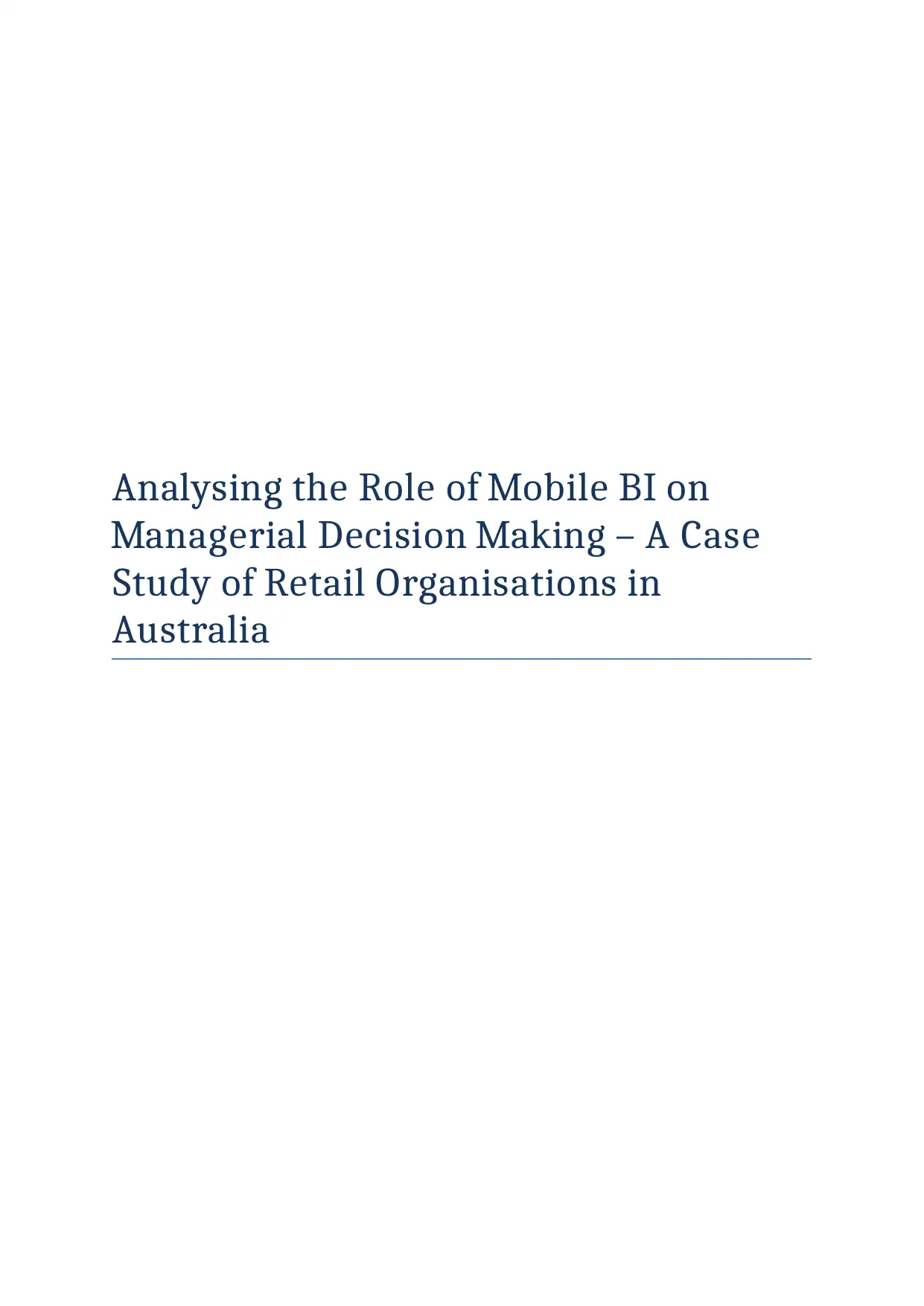
Analysing the Role of Mobile BI on
Managerial Decision Making – A Case
Study of Retail Organisations in
Australia
Managerial Decision Making – A Case
Study of Retail Organisations in
Australia
Paraphrase This Document
Need a fresh take? Get an instant paraphrase of this document with our AI Paraphraser
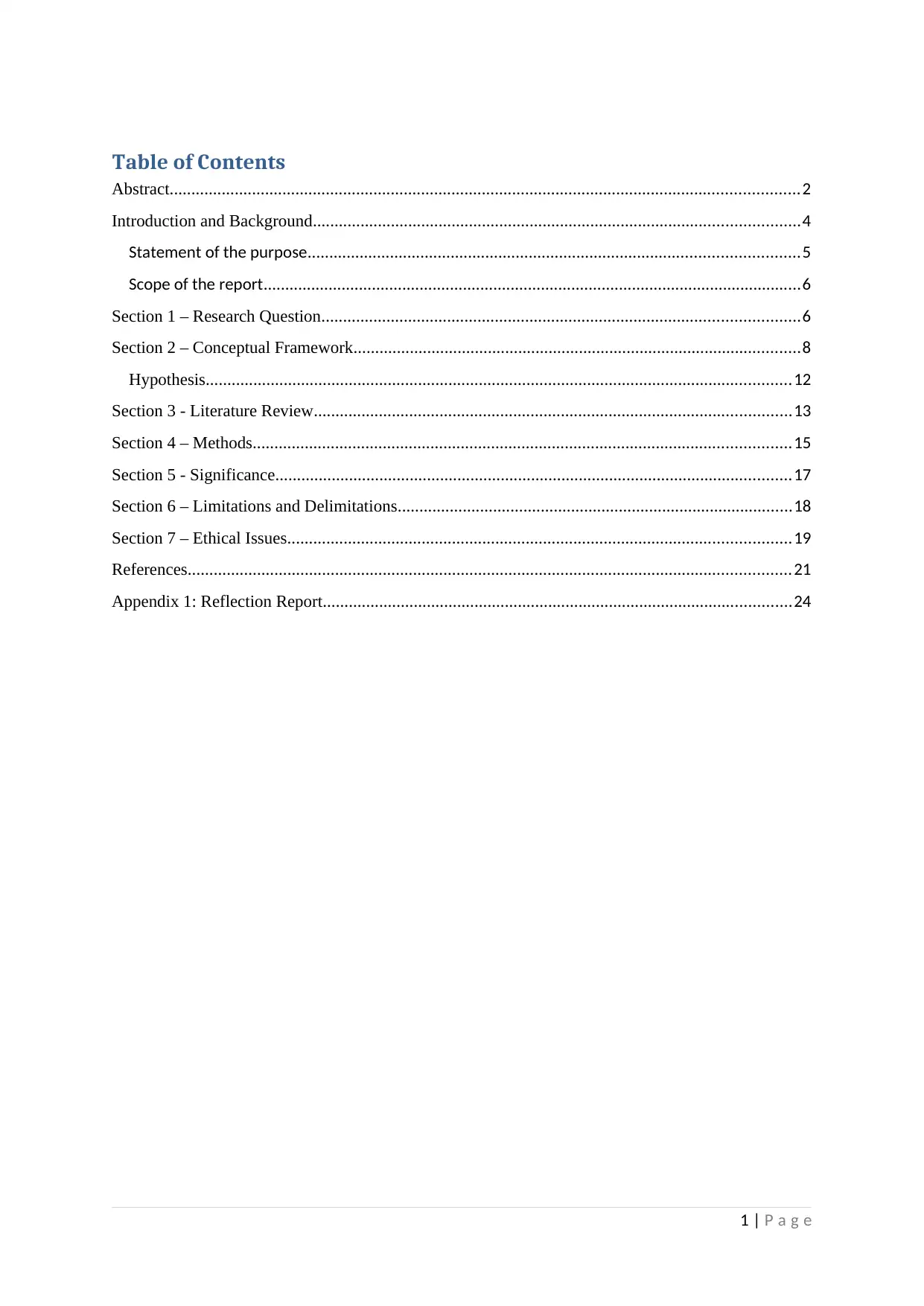
Table of Contents
Abstract.................................................................................................................................................2
Introduction and Background................................................................................................................4
Statement of the purpose.................................................................................................................5
Scope of the report............................................................................................................................6
Section 1 – Research Question..............................................................................................................6
Section 2 – Conceptual Framework.......................................................................................................8
Hypothesis.......................................................................................................................................12
Section 3 - Literature Review..............................................................................................................13
Section 4 – Methods............................................................................................................................15
Section 5 - Significance.......................................................................................................................17
Section 6 – Limitations and Delimitations...........................................................................................18
Section 7 – Ethical Issues....................................................................................................................19
References...........................................................................................................................................21
Appendix 1: Reflection Report............................................................................................................24
1 | P a g e
Abstract.................................................................................................................................................2
Introduction and Background................................................................................................................4
Statement of the purpose.................................................................................................................5
Scope of the report............................................................................................................................6
Section 1 – Research Question..............................................................................................................6
Section 2 – Conceptual Framework.......................................................................................................8
Hypothesis.......................................................................................................................................12
Section 3 - Literature Review..............................................................................................................13
Section 4 – Methods............................................................................................................................15
Section 5 - Significance.......................................................................................................................17
Section 6 – Limitations and Delimitations...........................................................................................18
Section 7 – Ethical Issues....................................................................................................................19
References...........................................................................................................................................21
Appendix 1: Reflection Report............................................................................................................24
1 | P a g e
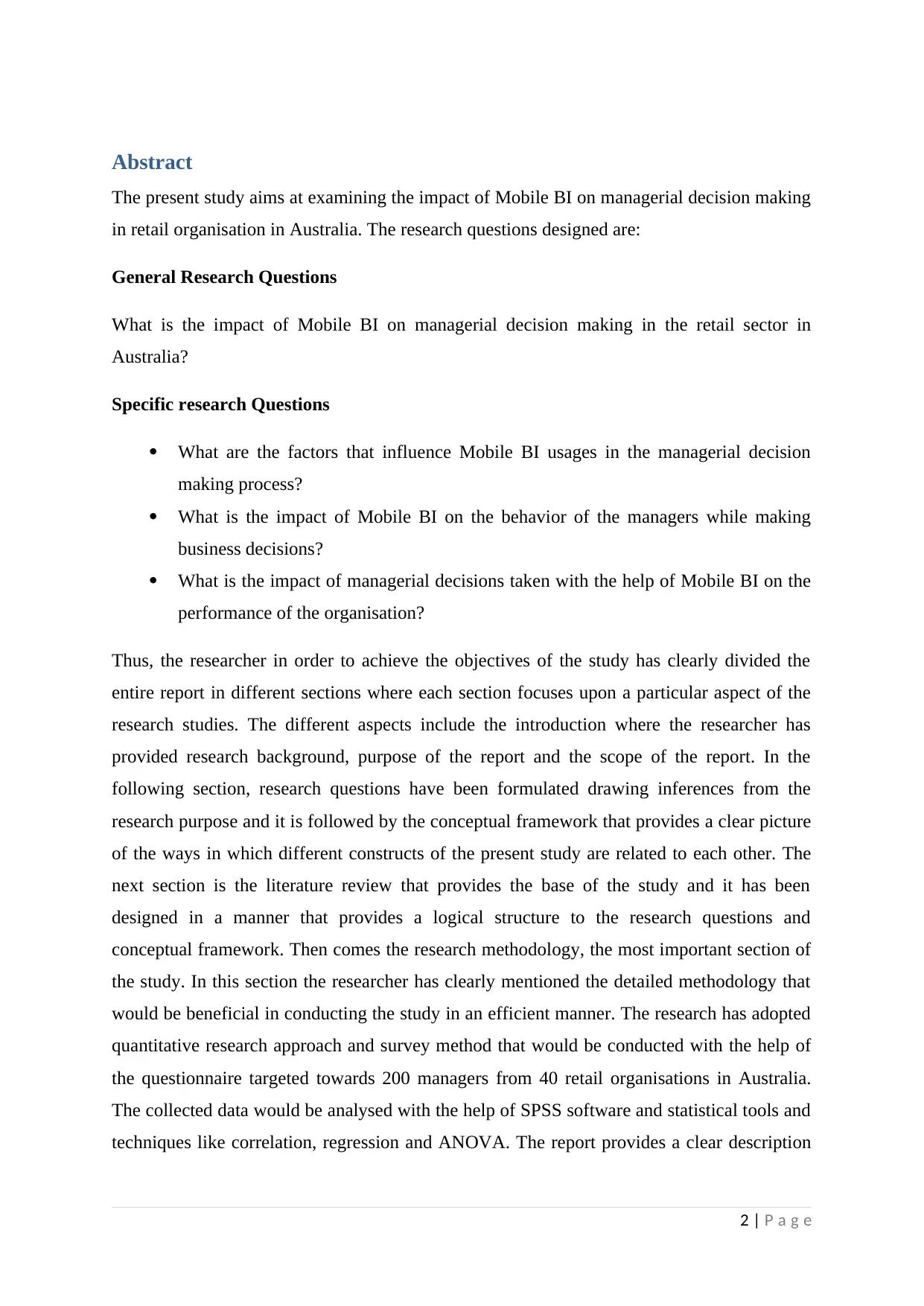
Abstract
The present study aims at examining the impact of Mobile BI on managerial decision making
in retail organisation in Australia. The research questions designed are:
General Research Questions
What is the impact of Mobile BI on managerial decision making in the retail sector in
Australia?
Specific research Questions
What are the factors that influence Mobile BI usages in the managerial decision
making process?
What is the impact of Mobile BI on the behavior of the managers while making
business decisions?
What is the impact of managerial decisions taken with the help of Mobile BI on the
performance of the organisation?
Thus, the researcher in order to achieve the objectives of the study has clearly divided the
entire report in different sections where each section focuses upon a particular aspect of the
research studies. The different aspects include the introduction where the researcher has
provided research background, purpose of the report and the scope of the report. In the
following section, research questions have been formulated drawing inferences from the
research purpose and it is followed by the conceptual framework that provides a clear picture
of the ways in which different constructs of the present study are related to each other. The
next section is the literature review that provides the base of the study and it has been
designed in a manner that provides a logical structure to the research questions and
conceptual framework. Then comes the research methodology, the most important section of
the study. In this section the researcher has clearly mentioned the detailed methodology that
would be beneficial in conducting the study in an efficient manner. The research has adopted
quantitative research approach and survey method that would be conducted with the help of
the questionnaire targeted towards 200 managers from 40 retail organisations in Australia.
The collected data would be analysed with the help of SPSS software and statistical tools and
techniques like correlation, regression and ANOVA. The report provides a clear description
2 | P a g e
The present study aims at examining the impact of Mobile BI on managerial decision making
in retail organisation in Australia. The research questions designed are:
General Research Questions
What is the impact of Mobile BI on managerial decision making in the retail sector in
Australia?
Specific research Questions
What are the factors that influence Mobile BI usages in the managerial decision
making process?
What is the impact of Mobile BI on the behavior of the managers while making
business decisions?
What is the impact of managerial decisions taken with the help of Mobile BI on the
performance of the organisation?
Thus, the researcher in order to achieve the objectives of the study has clearly divided the
entire report in different sections where each section focuses upon a particular aspect of the
research studies. The different aspects include the introduction where the researcher has
provided research background, purpose of the report and the scope of the report. In the
following section, research questions have been formulated drawing inferences from the
research purpose and it is followed by the conceptual framework that provides a clear picture
of the ways in which different constructs of the present study are related to each other. The
next section is the literature review that provides the base of the study and it has been
designed in a manner that provides a logical structure to the research questions and
conceptual framework. Then comes the research methodology, the most important section of
the study. In this section the researcher has clearly mentioned the detailed methodology that
would be beneficial in conducting the study in an efficient manner. The research has adopted
quantitative research approach and survey method that would be conducted with the help of
the questionnaire targeted towards 200 managers from 40 retail organisations in Australia.
The collected data would be analysed with the help of SPSS software and statistical tools and
techniques like correlation, regression and ANOVA. The report provides a clear description
2 | P a g e
⊘ This is a preview!⊘
Do you want full access?
Subscribe today to unlock all pages.

Trusted by 1+ million students worldwide
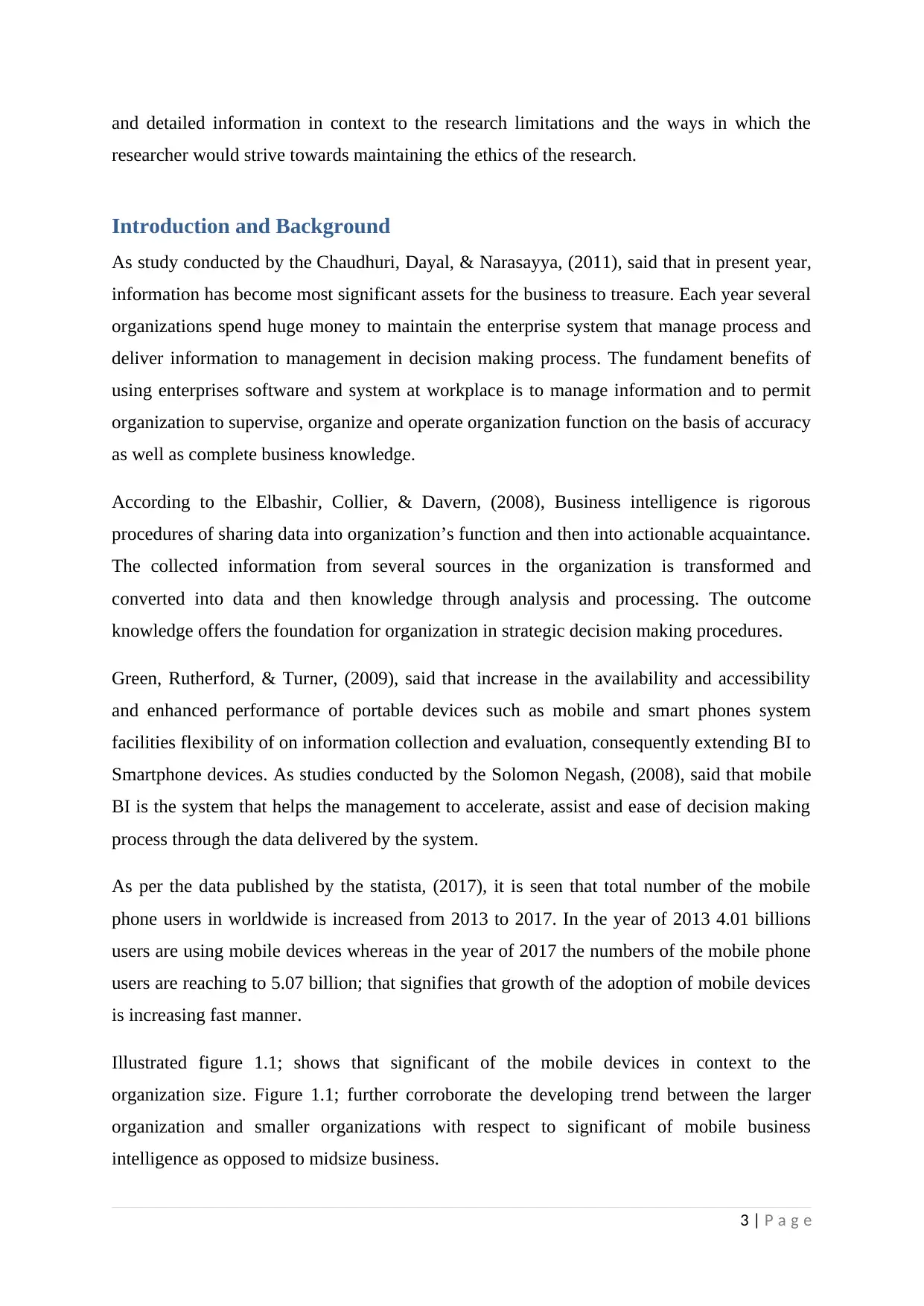
and detailed information in context to the research limitations and the ways in which the
researcher would strive towards maintaining the ethics of the research.
Introduction and Background
As study conducted by the Chaudhuri, Dayal, & Narasayya, (2011), said that in present year,
information has become most significant assets for the business to treasure. Each year several
organizations spend huge money to maintain the enterprise system that manage process and
deliver information to management in decision making process. The fundament benefits of
using enterprises software and system at workplace is to manage information and to permit
organization to supervise, organize and operate organization function on the basis of accuracy
as well as complete business knowledge.
According to the Elbashir, Collier, & Davern, (2008), Business intelligence is rigorous
procedures of sharing data into organization’s function and then into actionable acquaintance.
The collected information from several sources in the organization is transformed and
converted into data and then knowledge through analysis and processing. The outcome
knowledge offers the foundation for organization in strategic decision making procedures.
Green, Rutherford, & Turner, (2009), said that increase in the availability and accessibility
and enhanced performance of portable devices such as mobile and smart phones system
facilities flexibility of on information collection and evaluation, consequently extending BI to
Smartphone devices. As studies conducted by the Solomon Negash, (2008), said that mobile
BI is the system that helps the management to accelerate, assist and ease of decision making
process through the data delivered by the system.
As per the data published by the statista, (2017), it is seen that total number of the mobile
phone users in worldwide is increased from 2013 to 2017. In the year of 2013 4.01 billions
users are using mobile devices whereas in the year of 2017 the numbers of the mobile phone
users are reaching to 5.07 billion; that signifies that growth of the adoption of mobile devices
is increasing fast manner.
Illustrated figure 1.1; shows that significant of the mobile devices in context to the
organization size. Figure 1.1; further corroborate the developing trend between the larger
organization and smaller organizations with respect to significant of mobile business
intelligence as opposed to midsize business.
3 | P a g e
researcher would strive towards maintaining the ethics of the research.
Introduction and Background
As study conducted by the Chaudhuri, Dayal, & Narasayya, (2011), said that in present year,
information has become most significant assets for the business to treasure. Each year several
organizations spend huge money to maintain the enterprise system that manage process and
deliver information to management in decision making process. The fundament benefits of
using enterprises software and system at workplace is to manage information and to permit
organization to supervise, organize and operate organization function on the basis of accuracy
as well as complete business knowledge.
According to the Elbashir, Collier, & Davern, (2008), Business intelligence is rigorous
procedures of sharing data into organization’s function and then into actionable acquaintance.
The collected information from several sources in the organization is transformed and
converted into data and then knowledge through analysis and processing. The outcome
knowledge offers the foundation for organization in strategic decision making procedures.
Green, Rutherford, & Turner, (2009), said that increase in the availability and accessibility
and enhanced performance of portable devices such as mobile and smart phones system
facilities flexibility of on information collection and evaluation, consequently extending BI to
Smartphone devices. As studies conducted by the Solomon Negash, (2008), said that mobile
BI is the system that helps the management to accelerate, assist and ease of decision making
process through the data delivered by the system.
As per the data published by the statista, (2017), it is seen that total number of the mobile
phone users in worldwide is increased from 2013 to 2017. In the year of 2013 4.01 billions
users are using mobile devices whereas in the year of 2017 the numbers of the mobile phone
users are reaching to 5.07 billion; that signifies that growth of the adoption of mobile devices
is increasing fast manner.
Illustrated figure 1.1; shows that significant of the mobile devices in context to the
organization size. Figure 1.1; further corroborate the developing trend between the larger
organization and smaller organizations with respect to significant of mobile business
intelligence as opposed to midsize business.
3 | P a g e
Paraphrase This Document
Need a fresh take? Get an instant paraphrase of this document with our AI Paraphraser
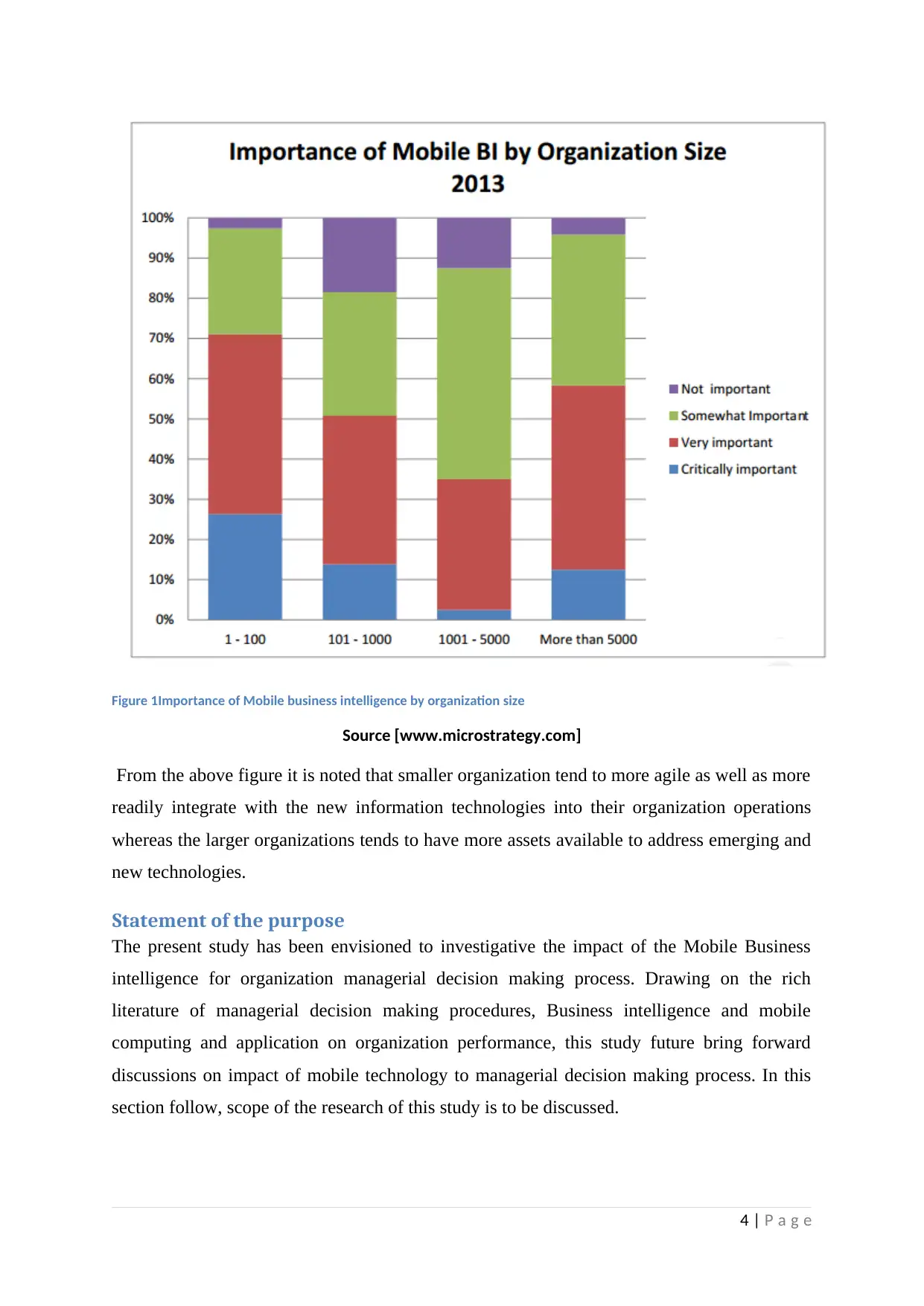
Figure 1Importance of Mobile business intelligence by organization size
Source [www.microstrategy.com]
From the above figure it is noted that smaller organization tend to more agile as well as more
readily integrate with the new information technologies into their organization operations
whereas the larger organizations tends to have more assets available to address emerging and
new technologies.
Statement of the purpose
The present study has been envisioned to investigative the impact of the Mobile Business
intelligence for organization managerial decision making process. Drawing on the rich
literature of managerial decision making procedures, Business intelligence and mobile
computing and application on organization performance, this study future bring forward
discussions on impact of mobile technology to managerial decision making process. In this
section follow, scope of the research of this study is to be discussed.
4 | P a g e
Source [www.microstrategy.com]
From the above figure it is noted that smaller organization tend to more agile as well as more
readily integrate with the new information technologies into their organization operations
whereas the larger organizations tends to have more assets available to address emerging and
new technologies.
Statement of the purpose
The present study has been envisioned to investigative the impact of the Mobile Business
intelligence for organization managerial decision making process. Drawing on the rich
literature of managerial decision making procedures, Business intelligence and mobile
computing and application on organization performance, this study future bring forward
discussions on impact of mobile technology to managerial decision making process. In this
section follow, scope of the research of this study is to be discussed.
4 | P a g e
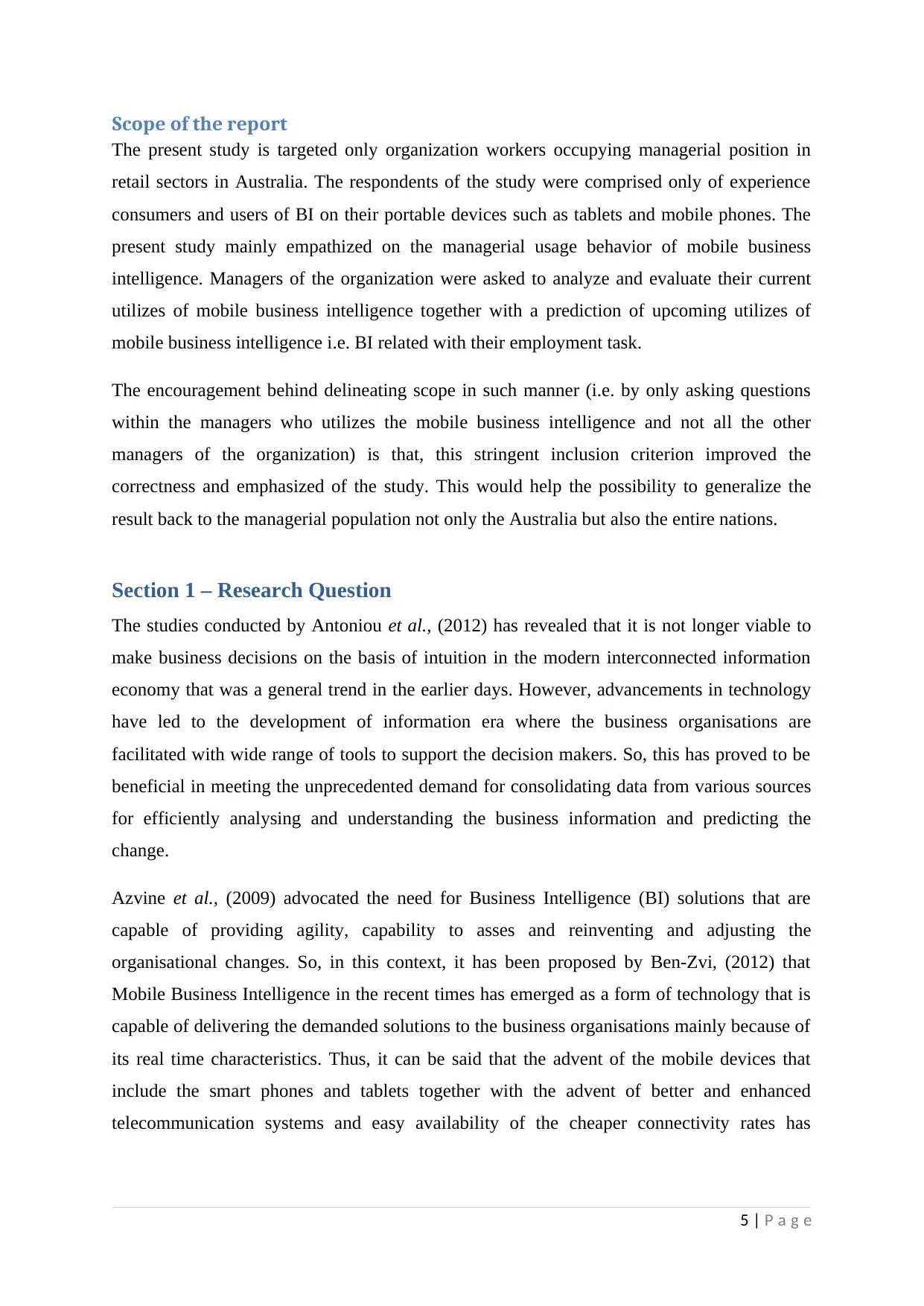
Scope of the report
The present study is targeted only organization workers occupying managerial position in
retail sectors in Australia. The respondents of the study were comprised only of experience
consumers and users of BI on their portable devices such as tablets and mobile phones. The
present study mainly empathized on the managerial usage behavior of mobile business
intelligence. Managers of the organization were asked to analyze and evaluate their current
utilizes of mobile business intelligence together with a prediction of upcoming utilizes of
mobile business intelligence i.e. BI related with their employment task.
The encouragement behind delineating scope in such manner (i.e. by only asking questions
within the managers who utilizes the mobile business intelligence and not all the other
managers of the organization) is that, this stringent inclusion criterion improved the
correctness and emphasized of the study. This would help the possibility to generalize the
result back to the managerial population not only the Australia but also the entire nations.
Section 1 – Research Question
The studies conducted by Antoniou et al., (2012) has revealed that it is not longer viable to
make business decisions on the basis of intuition in the modern interconnected information
economy that was a general trend in the earlier days. However, advancements in technology
have led to the development of information era where the business organisations are
facilitated with wide range of tools to support the decision makers. So, this has proved to be
beneficial in meeting the unprecedented demand for consolidating data from various sources
for efficiently analysing and understanding the business information and predicting the
change.
Azvine et al., (2009) advocated the need for Business Intelligence (BI) solutions that are
capable of providing agility, capability to asses and reinventing and adjusting the
organisational changes. So, in this context, it has been proposed by Ben-Zvi, (2012) that
Mobile Business Intelligence in the recent times has emerged as a form of technology that is
capable of delivering the demanded solutions to the business organisations mainly because of
its real time characteristics. Thus, it can be said that the advent of the mobile devices that
include the smart phones and tablets together with the advent of better and enhanced
telecommunication systems and easy availability of the cheaper connectivity rates has
5 | P a g e
The present study is targeted only organization workers occupying managerial position in
retail sectors in Australia. The respondents of the study were comprised only of experience
consumers and users of BI on their portable devices such as tablets and mobile phones. The
present study mainly empathized on the managerial usage behavior of mobile business
intelligence. Managers of the organization were asked to analyze and evaluate their current
utilizes of mobile business intelligence together with a prediction of upcoming utilizes of
mobile business intelligence i.e. BI related with their employment task.
The encouragement behind delineating scope in such manner (i.e. by only asking questions
within the managers who utilizes the mobile business intelligence and not all the other
managers of the organization) is that, this stringent inclusion criterion improved the
correctness and emphasized of the study. This would help the possibility to generalize the
result back to the managerial population not only the Australia but also the entire nations.
Section 1 – Research Question
The studies conducted by Antoniou et al., (2012) has revealed that it is not longer viable to
make business decisions on the basis of intuition in the modern interconnected information
economy that was a general trend in the earlier days. However, advancements in technology
have led to the development of information era where the business organisations are
facilitated with wide range of tools to support the decision makers. So, this has proved to be
beneficial in meeting the unprecedented demand for consolidating data from various sources
for efficiently analysing and understanding the business information and predicting the
change.
Azvine et al., (2009) advocated the need for Business Intelligence (BI) solutions that are
capable of providing agility, capability to asses and reinventing and adjusting the
organisational changes. So, in this context, it has been proposed by Ben-Zvi, (2012) that
Mobile Business Intelligence in the recent times has emerged as a form of technology that is
capable of delivering the demanded solutions to the business organisations mainly because of
its real time characteristics. Thus, it can be said that the advent of the mobile devices that
include the smart phones and tablets together with the advent of better and enhanced
telecommunication systems and easy availability of the cheaper connectivity rates has
5 | P a g e
⊘ This is a preview!⊘
Do you want full access?
Subscribe today to unlock all pages.

Trusted by 1+ million students worldwide
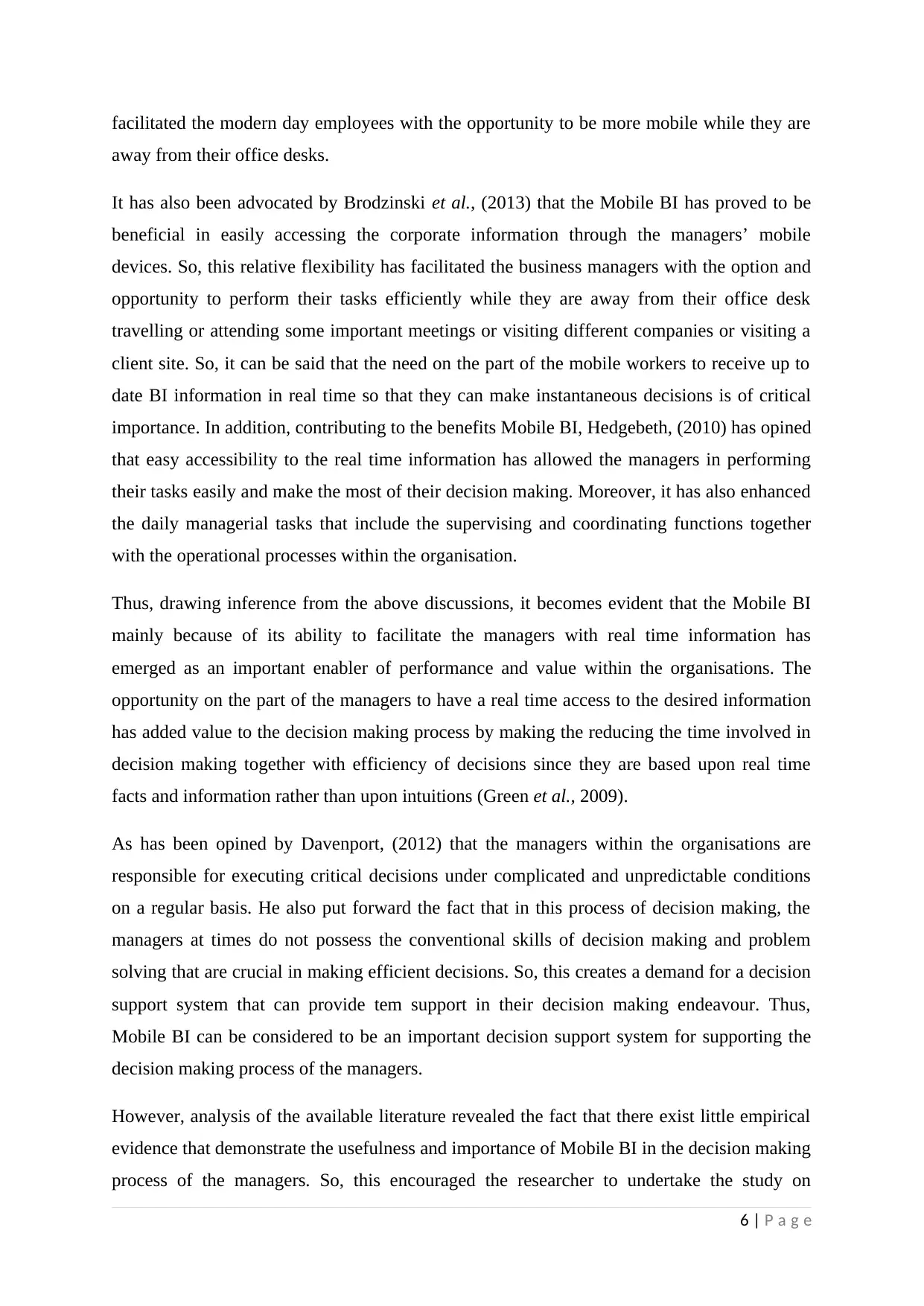
facilitated the modern day employees with the opportunity to be more mobile while they are
away from their office desks.
It has also been advocated by Brodzinski et al., (2013) that the Mobile BI has proved to be
beneficial in easily accessing the corporate information through the managers’ mobile
devices. So, this relative flexibility has facilitated the business managers with the option and
opportunity to perform their tasks efficiently while they are away from their office desk
travelling or attending some important meetings or visiting different companies or visiting a
client site. So, it can be said that the need on the part of the mobile workers to receive up to
date BI information in real time so that they can make instantaneous decisions is of critical
importance. In addition, contributing to the benefits Mobile BI, Hedgebeth, (2010) has opined
that easy accessibility to the real time information has allowed the managers in performing
their tasks easily and make the most of their decision making. Moreover, it has also enhanced
the daily managerial tasks that include the supervising and coordinating functions together
with the operational processes within the organisation.
Thus, drawing inference from the above discussions, it becomes evident that the Mobile BI
mainly because of its ability to facilitate the managers with real time information has
emerged as an important enabler of performance and value within the organisations. The
opportunity on the part of the managers to have a real time access to the desired information
has added value to the decision making process by making the reducing the time involved in
decision making together with efficiency of decisions since they are based upon real time
facts and information rather than upon intuitions (Green et al., 2009).
As has been opined by Davenport, (2012) that the managers within the organisations are
responsible for executing critical decisions under complicated and unpredictable conditions
on a regular basis. He also put forward the fact that in this process of decision making, the
managers at times do not possess the conventional skills of decision making and problem
solving that are crucial in making efficient decisions. So, this creates a demand for a decision
support system that can provide tem support in their decision making endeavour. Thus,
Mobile BI can be considered to be an important decision support system for supporting the
decision making process of the managers.
However, analysis of the available literature revealed the fact that there exist little empirical
evidence that demonstrate the usefulness and importance of Mobile BI in the decision making
process of the managers. So, this encouraged the researcher to undertake the study on
6 | P a g e
away from their office desks.
It has also been advocated by Brodzinski et al., (2013) that the Mobile BI has proved to be
beneficial in easily accessing the corporate information through the managers’ mobile
devices. So, this relative flexibility has facilitated the business managers with the option and
opportunity to perform their tasks efficiently while they are away from their office desk
travelling or attending some important meetings or visiting different companies or visiting a
client site. So, it can be said that the need on the part of the mobile workers to receive up to
date BI information in real time so that they can make instantaneous decisions is of critical
importance. In addition, contributing to the benefits Mobile BI, Hedgebeth, (2010) has opined
that easy accessibility to the real time information has allowed the managers in performing
their tasks easily and make the most of their decision making. Moreover, it has also enhanced
the daily managerial tasks that include the supervising and coordinating functions together
with the operational processes within the organisation.
Thus, drawing inference from the above discussions, it becomes evident that the Mobile BI
mainly because of its ability to facilitate the managers with real time information has
emerged as an important enabler of performance and value within the organisations. The
opportunity on the part of the managers to have a real time access to the desired information
has added value to the decision making process by making the reducing the time involved in
decision making together with efficiency of decisions since they are based upon real time
facts and information rather than upon intuitions (Green et al., 2009).
As has been opined by Davenport, (2012) that the managers within the organisations are
responsible for executing critical decisions under complicated and unpredictable conditions
on a regular basis. He also put forward the fact that in this process of decision making, the
managers at times do not possess the conventional skills of decision making and problem
solving that are crucial in making efficient decisions. So, this creates a demand for a decision
support system that can provide tem support in their decision making endeavour. Thus,
Mobile BI can be considered to be an important decision support system for supporting the
decision making process of the managers.
However, analysis of the available literature revealed the fact that there exist little empirical
evidence that demonstrate the usefulness and importance of Mobile BI in the decision making
process of the managers. So, this encouraged the researcher to undertake the study on
6 | P a g e
Paraphrase This Document
Need a fresh take? Get an instant paraphrase of this document with our AI Paraphraser
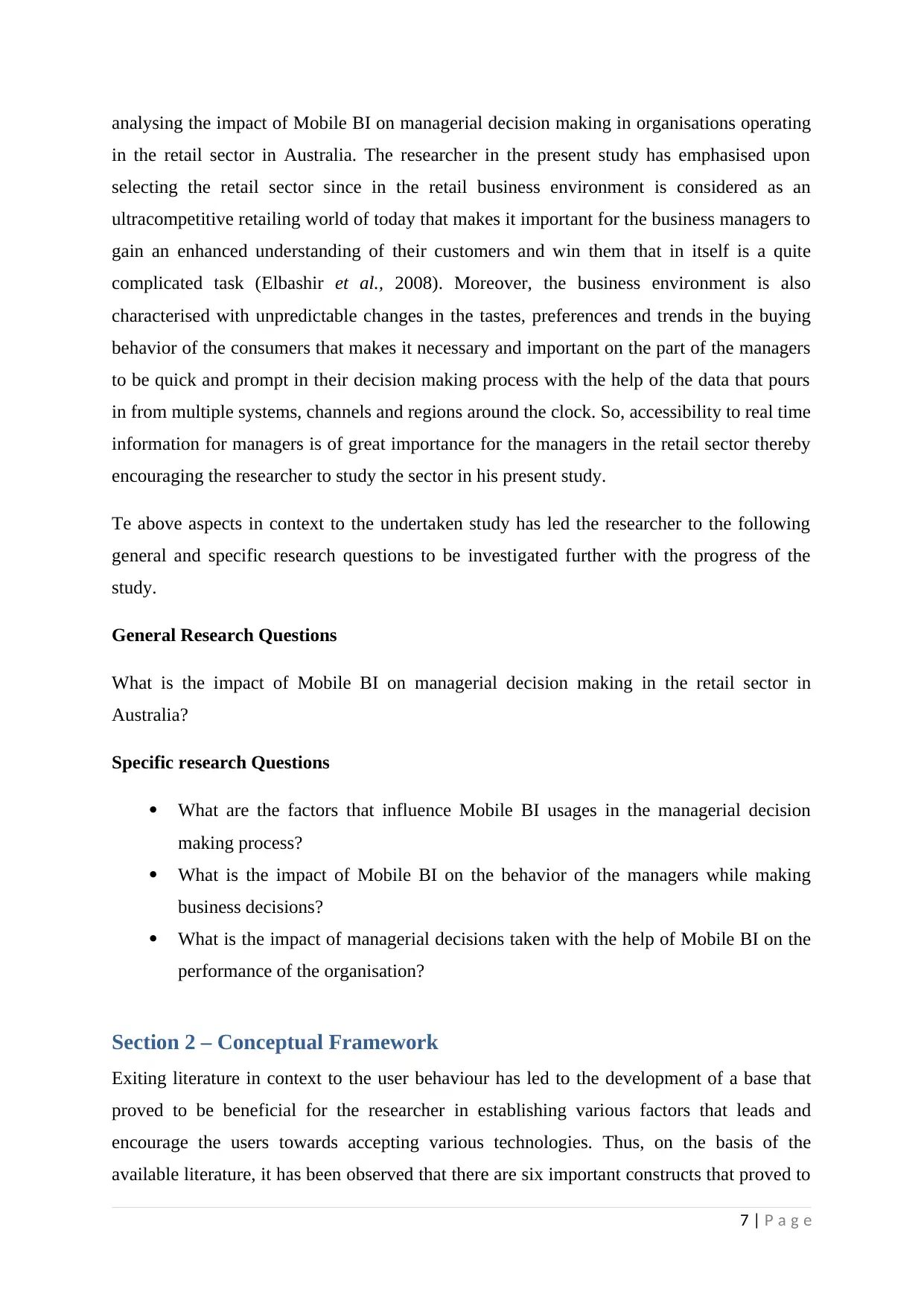
analysing the impact of Mobile BI on managerial decision making in organisations operating
in the retail sector in Australia. The researcher in the present study has emphasised upon
selecting the retail sector since in the retail business environment is considered as an
ultracompetitive retailing world of today that makes it important for the business managers to
gain an enhanced understanding of their customers and win them that in itself is a quite
complicated task (Elbashir et al., 2008). Moreover, the business environment is also
characterised with unpredictable changes in the tastes, preferences and trends in the buying
behavior of the consumers that makes it necessary and important on the part of the managers
to be quick and prompt in their decision making process with the help of the data that pours
in from multiple systems, channels and regions around the clock. So, accessibility to real time
information for managers is of great importance for the managers in the retail sector thereby
encouraging the researcher to study the sector in his present study.
Te above aspects in context to the undertaken study has led the researcher to the following
general and specific research questions to be investigated further with the progress of the
study.
General Research Questions
What is the impact of Mobile BI on managerial decision making in the retail sector in
Australia?
Specific research Questions
What are the factors that influence Mobile BI usages in the managerial decision
making process?
What is the impact of Mobile BI on the behavior of the managers while making
business decisions?
What is the impact of managerial decisions taken with the help of Mobile BI on the
performance of the organisation?
Section 2 – Conceptual Framework
Exiting literature in context to the user behaviour has led to the development of a base that
proved to be beneficial for the researcher in establishing various factors that leads and
encourage the users towards accepting various technologies. Thus, on the basis of the
available literature, it has been observed that there are six important constructs that proved to
7 | P a g e
in the retail sector in Australia. The researcher in the present study has emphasised upon
selecting the retail sector since in the retail business environment is considered as an
ultracompetitive retailing world of today that makes it important for the business managers to
gain an enhanced understanding of their customers and win them that in itself is a quite
complicated task (Elbashir et al., 2008). Moreover, the business environment is also
characterised with unpredictable changes in the tastes, preferences and trends in the buying
behavior of the consumers that makes it necessary and important on the part of the managers
to be quick and prompt in their decision making process with the help of the data that pours
in from multiple systems, channels and regions around the clock. So, accessibility to real time
information for managers is of great importance for the managers in the retail sector thereby
encouraging the researcher to study the sector in his present study.
Te above aspects in context to the undertaken study has led the researcher to the following
general and specific research questions to be investigated further with the progress of the
study.
General Research Questions
What is the impact of Mobile BI on managerial decision making in the retail sector in
Australia?
Specific research Questions
What are the factors that influence Mobile BI usages in the managerial decision
making process?
What is the impact of Mobile BI on the behavior of the managers while making
business decisions?
What is the impact of managerial decisions taken with the help of Mobile BI on the
performance of the organisation?
Section 2 – Conceptual Framework
Exiting literature in context to the user behaviour has led to the development of a base that
proved to be beneficial for the researcher in establishing various factors that leads and
encourage the users towards accepting various technologies. Thus, on the basis of the
available literature, it has been observed that there are six important constructs that proved to
7 | P a g e
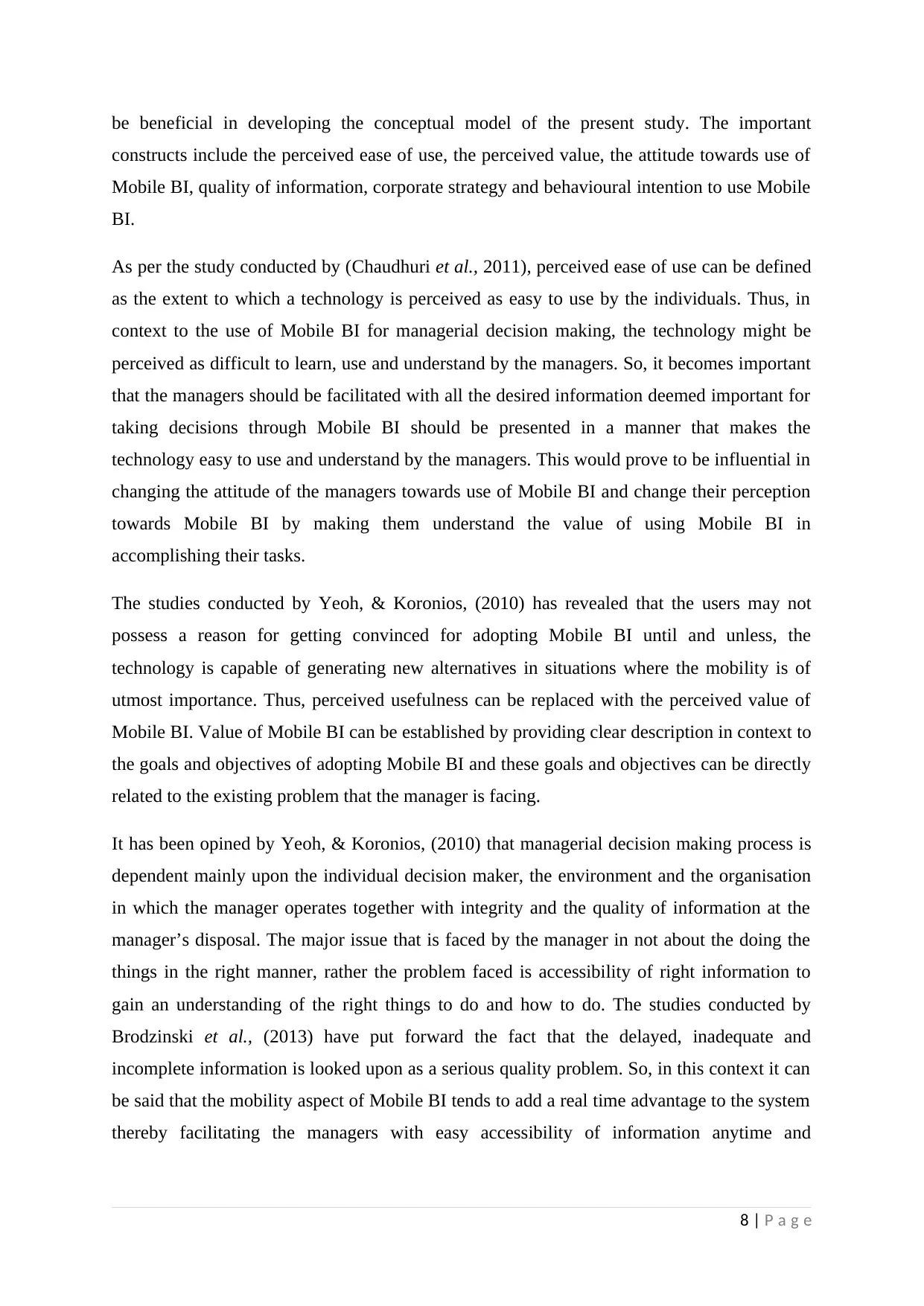
be beneficial in developing the conceptual model of the present study. The important
constructs include the perceived ease of use, the perceived value, the attitude towards use of
Mobile BI, quality of information, corporate strategy and behavioural intention to use Mobile
BI.
As per the study conducted by (Chaudhuri et al., 2011), perceived ease of use can be defined
as the extent to which a technology is perceived as easy to use by the individuals. Thus, in
context to the use of Mobile BI for managerial decision making, the technology might be
perceived as difficult to learn, use and understand by the managers. So, it becomes important
that the managers should be facilitated with all the desired information deemed important for
taking decisions through Mobile BI should be presented in a manner that makes the
technology easy to use and understand by the managers. This would prove to be influential in
changing the attitude of the managers towards use of Mobile BI and change their perception
towards Mobile BI by making them understand the value of using Mobile BI in
accomplishing their tasks.
The studies conducted by Yeoh, & Koronios, (2010) has revealed that the users may not
possess a reason for getting convinced for adopting Mobile BI until and unless, the
technology is capable of generating new alternatives in situations where the mobility is of
utmost importance. Thus, perceived usefulness can be replaced with the perceived value of
Mobile BI. Value of Mobile BI can be established by providing clear description in context to
the goals and objectives of adopting Mobile BI and these goals and objectives can be directly
related to the existing problem that the manager is facing.
It has been opined by Yeoh, & Koronios, (2010) that managerial decision making process is
dependent mainly upon the individual decision maker, the environment and the organisation
in which the manager operates together with integrity and the quality of information at the
manager’s disposal. The major issue that is faced by the manager in not about the doing the
things in the right manner, rather the problem faced is accessibility of right information to
gain an understanding of the right things to do and how to do. The studies conducted by
Brodzinski et al., (2013) have put forward the fact that the delayed, inadequate and
incomplete information is looked upon as a serious quality problem. So, in this context it can
be said that the mobility aspect of Mobile BI tends to add a real time advantage to the system
thereby facilitating the managers with easy accessibility of information anytime and
8 | P a g e
constructs include the perceived ease of use, the perceived value, the attitude towards use of
Mobile BI, quality of information, corporate strategy and behavioural intention to use Mobile
BI.
As per the study conducted by (Chaudhuri et al., 2011), perceived ease of use can be defined
as the extent to which a technology is perceived as easy to use by the individuals. Thus, in
context to the use of Mobile BI for managerial decision making, the technology might be
perceived as difficult to learn, use and understand by the managers. So, it becomes important
that the managers should be facilitated with all the desired information deemed important for
taking decisions through Mobile BI should be presented in a manner that makes the
technology easy to use and understand by the managers. This would prove to be influential in
changing the attitude of the managers towards use of Mobile BI and change their perception
towards Mobile BI by making them understand the value of using Mobile BI in
accomplishing their tasks.
The studies conducted by Yeoh, & Koronios, (2010) has revealed that the users may not
possess a reason for getting convinced for adopting Mobile BI until and unless, the
technology is capable of generating new alternatives in situations where the mobility is of
utmost importance. Thus, perceived usefulness can be replaced with the perceived value of
Mobile BI. Value of Mobile BI can be established by providing clear description in context to
the goals and objectives of adopting Mobile BI and these goals and objectives can be directly
related to the existing problem that the manager is facing.
It has been opined by Yeoh, & Koronios, (2010) that managerial decision making process is
dependent mainly upon the individual decision maker, the environment and the organisation
in which the manager operates together with integrity and the quality of information at the
manager’s disposal. The major issue that is faced by the manager in not about the doing the
things in the right manner, rather the problem faced is accessibility of right information to
gain an understanding of the right things to do and how to do. The studies conducted by
Brodzinski et al., (2013) have put forward the fact that the delayed, inadequate and
incomplete information is looked upon as a serious quality problem. So, in this context it can
be said that the mobility aspect of Mobile BI tends to add a real time advantage to the system
thereby facilitating the managers with easy accessibility of information anytime and
8 | P a g e
⊘ This is a preview!⊘
Do you want full access?
Subscribe today to unlock all pages.

Trusted by 1+ million students worldwide
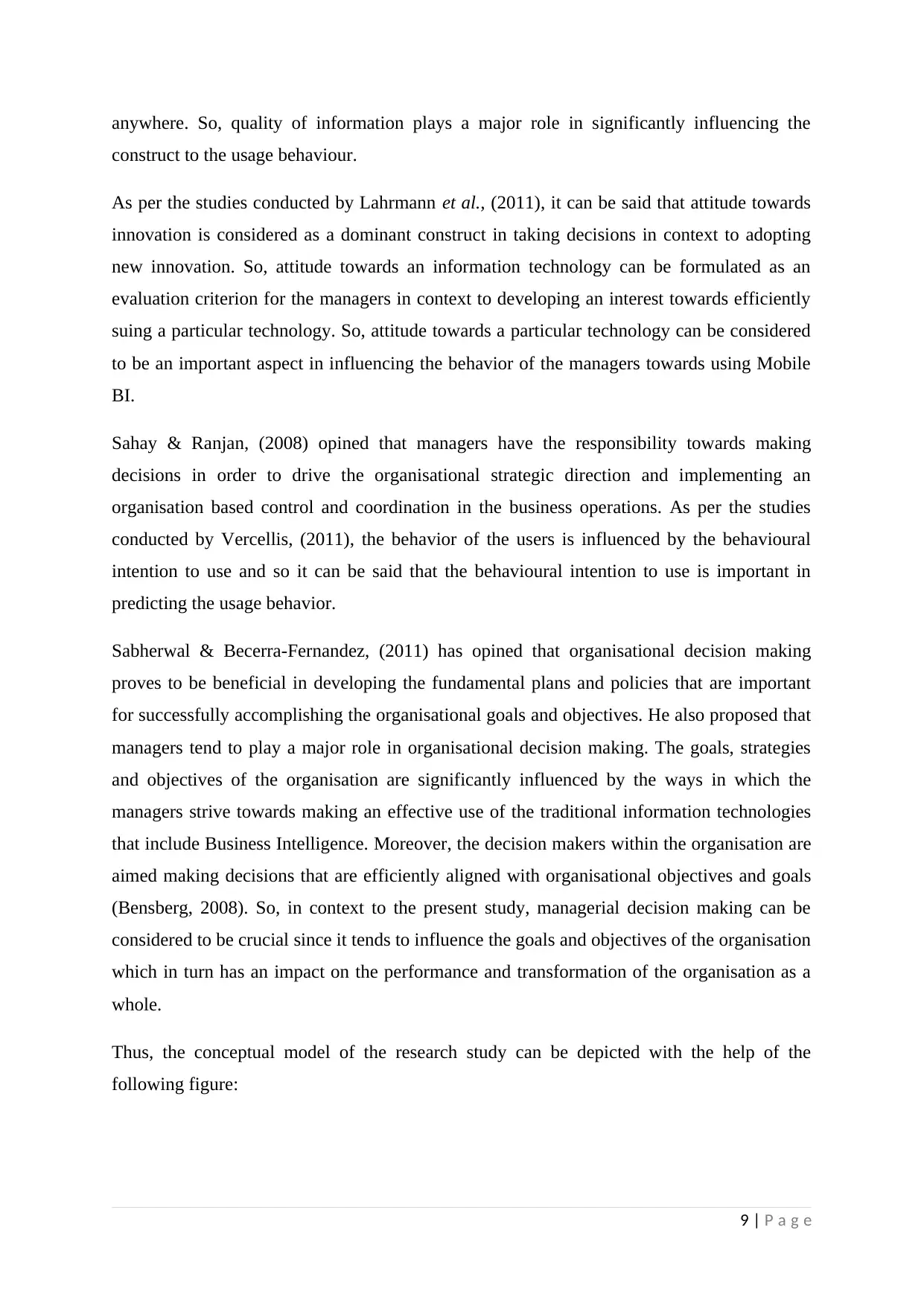
anywhere. So, quality of information plays a major role in significantly influencing the
construct to the usage behaviour.
As per the studies conducted by Lahrmann et al., (2011), it can be said that attitude towards
innovation is considered as a dominant construct in taking decisions in context to adopting
new innovation. So, attitude towards an information technology can be formulated as an
evaluation criterion for the managers in context to developing an interest towards efficiently
suing a particular technology. So, attitude towards a particular technology can be considered
to be an important aspect in influencing the behavior of the managers towards using Mobile
BI.
Sahay & Ranjan, (2008) opined that managers have the responsibility towards making
decisions in order to drive the organisational strategic direction and implementing an
organisation based control and coordination in the business operations. As per the studies
conducted by Vercellis, (2011), the behavior of the users is influenced by the behavioural
intention to use and so it can be said that the behavioural intention to use is important in
predicting the usage behavior.
Sabherwal & Becerra-Fernandez, (2011) has opined that organisational decision making
proves to be beneficial in developing the fundamental plans and policies that are important
for successfully accomplishing the organisational goals and objectives. He also proposed that
managers tend to play a major role in organisational decision making. The goals, strategies
and objectives of the organisation are significantly influenced by the ways in which the
managers strive towards making an effective use of the traditional information technologies
that include Business Intelligence. Moreover, the decision makers within the organisation are
aimed making decisions that are efficiently aligned with organisational objectives and goals
(Bensberg, 2008). So, in context to the present study, managerial decision making can be
considered to be crucial since it tends to influence the goals and objectives of the organisation
which in turn has an impact on the performance and transformation of the organisation as a
whole.
Thus, the conceptual model of the research study can be depicted with the help of the
following figure:
9 | P a g e
construct to the usage behaviour.
As per the studies conducted by Lahrmann et al., (2011), it can be said that attitude towards
innovation is considered as a dominant construct in taking decisions in context to adopting
new innovation. So, attitude towards an information technology can be formulated as an
evaluation criterion for the managers in context to developing an interest towards efficiently
suing a particular technology. So, attitude towards a particular technology can be considered
to be an important aspect in influencing the behavior of the managers towards using Mobile
BI.
Sahay & Ranjan, (2008) opined that managers have the responsibility towards making
decisions in order to drive the organisational strategic direction and implementing an
organisation based control and coordination in the business operations. As per the studies
conducted by Vercellis, (2011), the behavior of the users is influenced by the behavioural
intention to use and so it can be said that the behavioural intention to use is important in
predicting the usage behavior.
Sabherwal & Becerra-Fernandez, (2011) has opined that organisational decision making
proves to be beneficial in developing the fundamental plans and policies that are important
for successfully accomplishing the organisational goals and objectives. He also proposed that
managers tend to play a major role in organisational decision making. The goals, strategies
and objectives of the organisation are significantly influenced by the ways in which the
managers strive towards making an effective use of the traditional information technologies
that include Business Intelligence. Moreover, the decision makers within the organisation are
aimed making decisions that are efficiently aligned with organisational objectives and goals
(Bensberg, 2008). So, in context to the present study, managerial decision making can be
considered to be crucial since it tends to influence the goals and objectives of the organisation
which in turn has an impact on the performance and transformation of the organisation as a
whole.
Thus, the conceptual model of the research study can be depicted with the help of the
following figure:
9 | P a g e
Paraphrase This Document
Need a fresh take? Get an instant paraphrase of this document with our AI Paraphraser

10 | P a g e
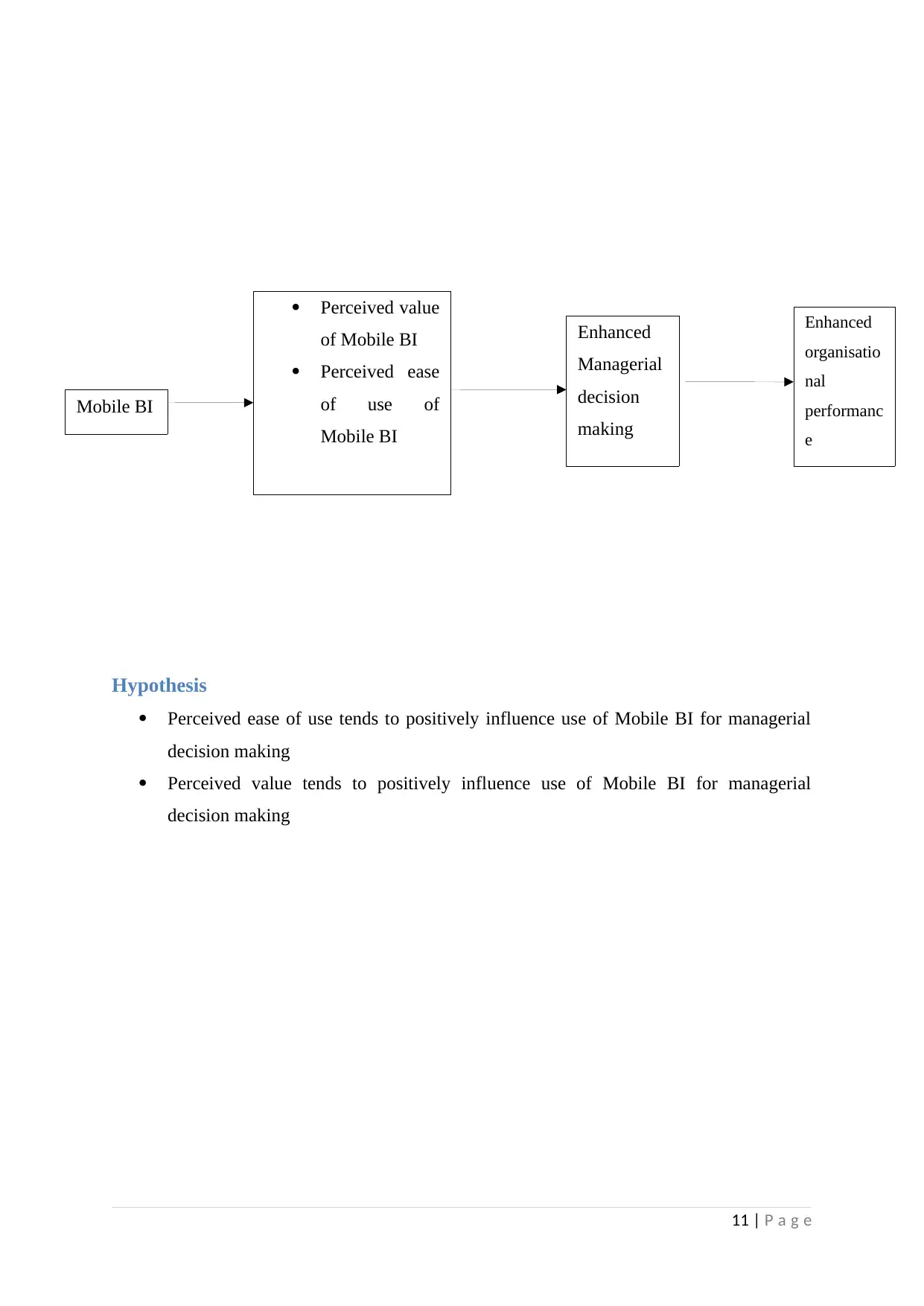
Hypothesis
Perceived ease of use tends to positively influence use of Mobile BI for managerial
decision making
Perceived value tends to positively influence use of Mobile BI for managerial
decision making
11 | P a g e
Mobile BI
Perceived value
of Mobile BI
Perceived ease
of use of
Mobile BI
Enhanced
Managerial
decision
making
Enhanced
organisatio
nal
performanc
e
Perceived ease of use tends to positively influence use of Mobile BI for managerial
decision making
Perceived value tends to positively influence use of Mobile BI for managerial
decision making
11 | P a g e
Mobile BI
Perceived value
of Mobile BI
Perceived ease
of use of
Mobile BI
Enhanced
Managerial
decision
making
Enhanced
organisatio
nal
performanc
e
⊘ This is a preview!⊘
Do you want full access?
Subscribe today to unlock all pages.

Trusted by 1+ million students worldwide
1 out of 24
Related Documents
Your All-in-One AI-Powered Toolkit for Academic Success.
+13062052269
info@desklib.com
Available 24*7 on WhatsApp / Email
![[object Object]](/_next/static/media/star-bottom.7253800d.svg)
Unlock your academic potential
Copyright © 2020–2026 A2Z Services. All Rights Reserved. Developed and managed by ZUCOL.



